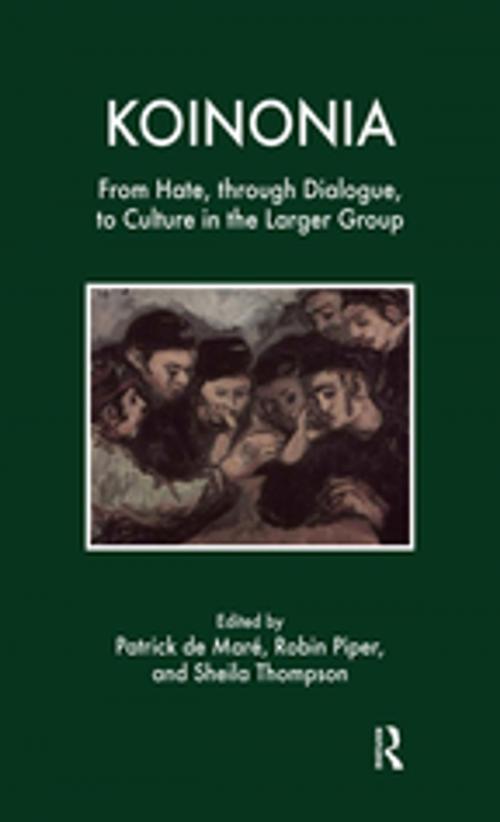Koinonia
From Hate, through Dialogue, to Culture in the Larger Group
Nonfiction, Health & Well Being, Psychology, Mental Health| Author: | ISBN: | 9780429915468 | |
| Publisher: | Taylor and Francis | Publication: | April 24, 2018 |
| Imprint: | Routledge | Language: | English |
| Author: | |
| ISBN: | 9780429915468 |
| Publisher: | Taylor and Francis |
| Publication: | April 24, 2018 |
| Imprint: | Routledge |
| Language: | English |
A study of the larger group, focusing on the processes and dynamics whereby the group micro-culture emerges. As the initial frustrations of the group find expression in hate, this is transformed through dialogue to what the Greeks knew as ‘koinonia’, or the state of impersonal fellowship. Essentially, Koinonia concerns itself with an operational approach to dialogue, culture and the human mind through the medium of a larger group context, and adopts a direction similar in many ways to the groupanalytic method of S. H. Foulkes. In attempting to link the most intimate aspect of individual beings naturally and spontaneously in the socio-cultural setting of the larger group, by the very nature of its size, offers a structure or medium for linking inner world with cultural context, and is thus able to establish a unique dimension – that of the micro-culture. Until now neither psychoanalysis nor small groups have been able to handle this aspect empirically, since, in the former, the analyst represents the assumed culture, while in the small group situation the hierarchy of the family culture inevitably prevails. The larger group displays the other side of the coin to the inner world, namely the socio-cultural dimension in which interpersonal relationships take place. The exploration of this field shows how objects, including part objects of the mind, can be related to systems and structures in a manner not previously attempted, and raises the vexed question of the relationship of systems to structures and of culture to social context. In this study of the larger group, particular attention is paid to the processes and dynamics whereby the group micro-culture emerges, as the initial frustrations of the group find their expression through hate; as hate initiates, and is transformed by, dialogue; and as dialogue ultimately establishes what the Greeks knew as ‘koinonia’, or the state of impersonal fellowship.
A study of the larger group, focusing on the processes and dynamics whereby the group micro-culture emerges. As the initial frustrations of the group find expression in hate, this is transformed through dialogue to what the Greeks knew as ‘koinonia’, or the state of impersonal fellowship. Essentially, Koinonia concerns itself with an operational approach to dialogue, culture and the human mind through the medium of a larger group context, and adopts a direction similar in many ways to the groupanalytic method of S. H. Foulkes. In attempting to link the most intimate aspect of individual beings naturally and spontaneously in the socio-cultural setting of the larger group, by the very nature of its size, offers a structure or medium for linking inner world with cultural context, and is thus able to establish a unique dimension – that of the micro-culture. Until now neither psychoanalysis nor small groups have been able to handle this aspect empirically, since, in the former, the analyst represents the assumed culture, while in the small group situation the hierarchy of the family culture inevitably prevails. The larger group displays the other side of the coin to the inner world, namely the socio-cultural dimension in which interpersonal relationships take place. The exploration of this field shows how objects, including part objects of the mind, can be related to systems and structures in a manner not previously attempted, and raises the vexed question of the relationship of systems to structures and of culture to social context. In this study of the larger group, particular attention is paid to the processes and dynamics whereby the group micro-culture emerges, as the initial frustrations of the group find their expression through hate; as hate initiates, and is transformed by, dialogue; and as dialogue ultimately establishes what the Greeks knew as ‘koinonia’, or the state of impersonal fellowship.















